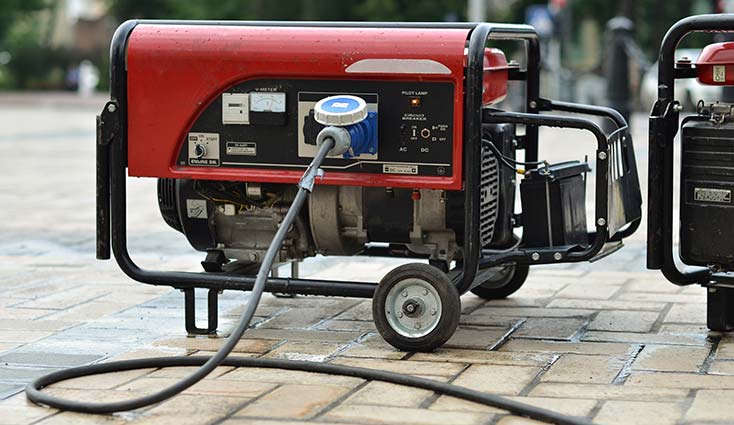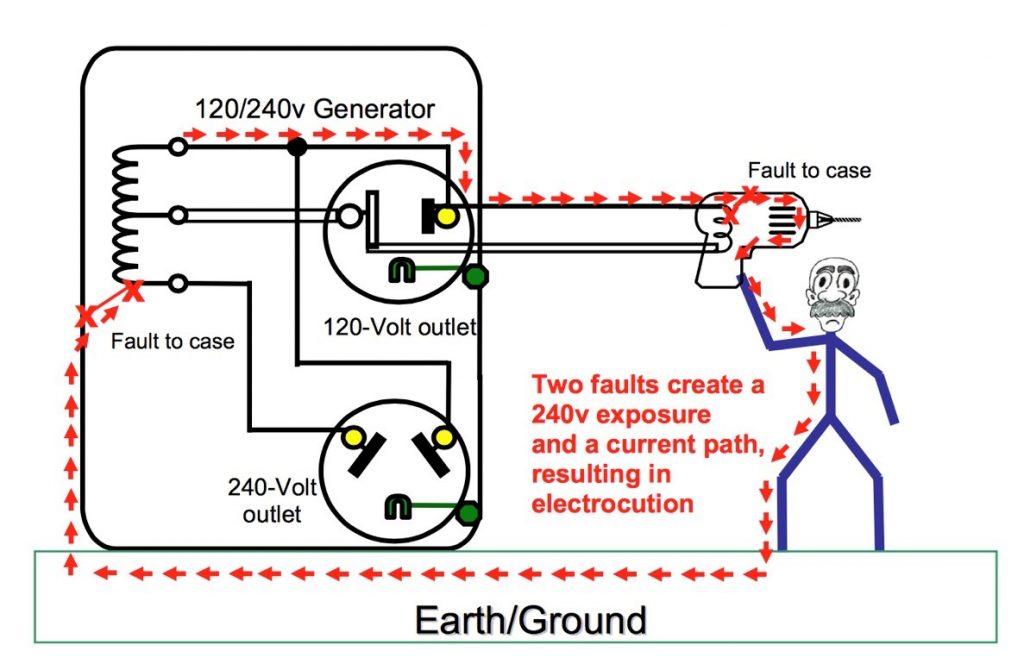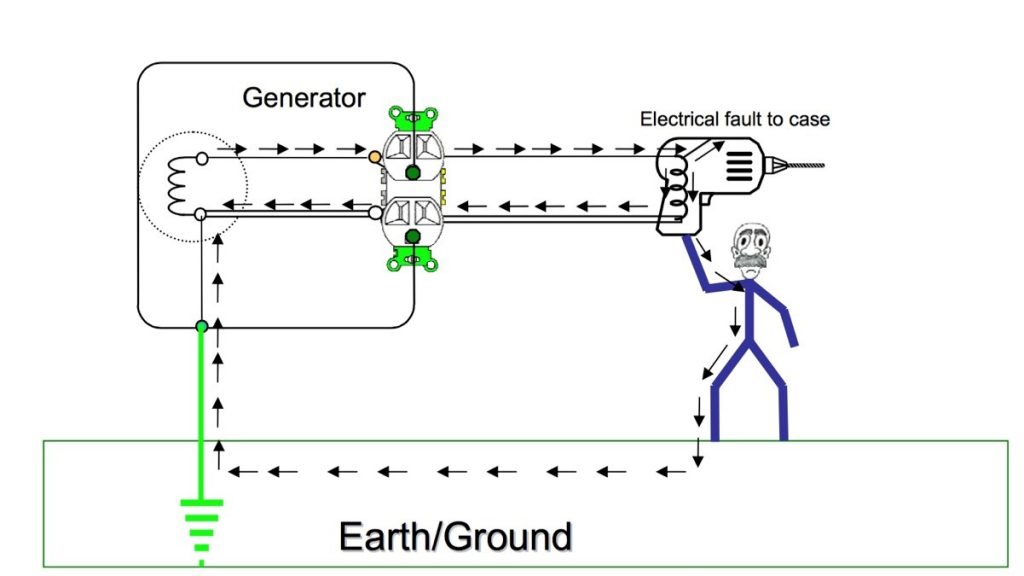Grounding Requirements for Portable Generators

By: Stan Turkel | Jul 17, 2018
By: Stan Turkel.
Portable generators are useful for when temporary or remote power is needed. Knowing when to ground a generator is critical for operator safety. OSHA guidelines can keep you safe and help you avoid any electrical violations.
The principal function of the system ground, or grounding electrode, (ground rod), is lightning protection for equipment (NEC Article 250.4). Adding a ground rod to a portable generator introduces a shock hazard as can be seen in the illustration.
OSHA Grounding Requirements for portable and vehicle-mounted generators state the following:
Under the following conditions, OSHA directs (29 CFR 1926.404(f)(3)(i)) that the frame of a portable generator need not be grounded (connected to earth) and that the frame may serve as the ground (in place of the earth):
The generator supplies only equipment mounted on the generator and/or cord and plug-connected equipment through receptacles mounted on the generator, § 1926.404(f)(3)(i)(A). The noncurrent-carrying metal parts of equipment (such as the fuel tank, the internal combustion engine, and the generator’s housing) are bonded to the generator frame, and the equipment grounding conductor terminals (of the power receptacles that are a part of [mounted on] the generator) are bonded to the generator frame, § 1926.404(f)(3)(i)(B).
Thus, rather than connect to a grounding electrode system, such as a driven ground rod, the generator’s frame replaces the grounding electrode.
If these conditions do not exist, then a grounding electrode, such as a ground rod, is required.
If the portable generator is providing electric power to a structure by connection via a transfer switch to a structure (home, office, shop, trailer, or similar), it must be connected to a grounding electrode system, such as a driven ground rod. The transfer switch must be approved for the use and installed in accordance with the manufacturer’s installation instructions by a qualified electrician.
Grounding requirements for generators connected via transfer switches are covered by Article 250 of the National Electrical Code (NEC).
Portable generators require safe work practices, and often these are overlooked went brought to the site. Here is a checklist to keep you safe.
• Maintain and operate portable generators by following the manufacturer’s use and safety instructions.
• Never attach a portable generator directly to the electrical system of a structure (home, office or trailer) unless the generator has a properly installed open-transition transfer switch.
• Always plug electrical appliances and tools directly into the generator, using the appliance manufacturer’s supplied cords.
• Use heavy-duty extension cords that contain a grounding conductor (3-wire flexible cord and 3-pronged cord connectors).
• Use ground-fault circuit interrupters (GFCIs) as per the manufacturer’s instructions.
• Do not connect a generator to a structure unless the generator has a correctly installed transfer switch.
• Visually inspect the equipment before use; remove defective equipment from service; mark or tag it as unsafe for use.
• All generators should be checked yearly for the integrity of the connection between the generator’s frame, and the equipment grounding terminals of power receptacles are essential to the safe use of the equipment. The connection may be confirmed via testing by a competent electrician with the correct equipment. The ohmic resistance should measure near zero and must not be intermittent, which indicates a loose connection.

To learn more, take electrical continuing education online with JADE Learning. Browse our electrical license exam prep courses now.


Thanks for the information on the requirements for grounding portable generators, such as how the frame replaces the electrodes and a rod is necessary if the right conditions aren’t met. When purchasing one, it would probably be a good idea to research the requirements that are necessary for the brand and model you have in order to ensure that it can be done properly so you can prevent problems. It might also help to hire a professional that specializes in grounding portable generators so that they can make sure everything is set up correctly and teach you how to do it to ensure you know the right equipment and process.
Help. Purchased a portable generator last Fall after the hurricanes just in case but not realizing all the particulars. During the rush to get generators during before, during and after the storm I heard absolutely no one say anything about a grounding rod yet many of the people in the lines were also new to purchasing a generator. The manual says it s/b grounded to a grounding rod driven at least 24 inches in the ground so why isn’t the frame serving as the ground when using the receptacles per OSHA guidelines?! I’ve read several articles and they seem to contradict each other. Now you’re implying that if I do indeed ground it just to safer than sorry then I could be setting myself up to be electrocuted?! Thoroughly confused now.
If using the receptacle to supply power to for instance to a refrigerator or a tool, it is not necessary to to use a ground rod, however if you are using the generator to power the home, then it is necessary.
A transfer switch is also required for permanent back up generators for a structure/home. A transfer switch is designed so only one power source can be used at a time, either normal power from the power company or power from the generator. Without a transfer switch, the power from your generator can back feed and potentially injure workers trying to repair lines. When a generator is used in this manner it must be grounded to a grounding electrode/rod.
Hope this helps.
What about a 1947 home with an ungrounded system with a mechanical generator safety interlock that will not physically allow both breakers to come on at the same time. The panel has a ground bus of course but only grounds the can or panel. And the generator would only be put in place during an outage.
I have a portable generator and had an electrician install a switch in a new service box so that when my generator is connected to the house, the main breaker is off isolating the outside power from my generator. This idea of a ground rod is new. I noticed it when reading my generator manual. I have a question about the ground rod, which I am quite willing to add.
My generator is portable. When used to power the house during outages, it is always in the same location, near the connection point I had the electrician install with the new box. Is there any way I can make the connection to the ground bar ‘portable’ also, because I keep the generator in my shop when not needed. I don’t want to have to use a wrench to connect/disconnect the generator when I need it, always in an emergency.
Just FYI, I did some research and found an alarm that screeches when power is restored. It wraps around one of the mail lines feeding the box, cost like $30, and I found it researching what I thought simply had to exist.
Hello Jade,
I would like to know if FL law allows hook up of generator with TT-30P (3 wire) to house panel using L14-30P (4 wire) by hot bridging the 120Vs. I don’t need 240V (Generator does not produce one) and I will use the generator interlock mechanism installed by a professional electrician.
I
Virg. If connected to a house via a transfer switch, a generator is grounded by the ground wire in the power cable that runs from the generator to the distribution panel and to the grounding bus bar which is connected to the house ground. Transfer switches typically only switch the hot wires. Some also switch the neutral wire. I don’t know of any that switch the ground wire. So I don’t see a need for a separate grounding rod.
Thanks, Virg!!
Great way to explain the grounding procedure very well!
Kenneth P.
So, it seems that I can power refrigerator by extension cord without grounding during power outage, since generator frame works as a ground. Then, do I need to bond neutral to ground in my generator to power refrigerator, if generator has floating neutral?
I have never seen anyone ground a portable generator, nor would I do so.
If you’re powering your house or RV then the ground from the gen is already connected to the house/RV via the plug. Not that it does anything but what is the point of adding a ground rod? Unless you expect to be touching the gen at the same moment your RV gets hit with lightning, and if so then you’re far better off grounding the RV, not the gen.
I don’t even connect the ground of the gens outlet to anything, I just use the two hot wires for 120. Aside from a ground being pointless, 8/2 wire is cheaper than 8/3, so I use 8/2 Romex to make a cord to to supply power to the house or RV. I’m sure as heck am not going to pay for an 8ga extension cord. Speaking of that, most people do not use a heavy enough cord and/or use chinese cords, which increase the odds of burning up plugs and outlets and risk actual danger from fire.
To any naysayers I ask; give a scenario where a grounded gen is safer than an ungrounded gen.
I agree, I use the 50 amp plug which has a ground, my receptacle is grounded, my manual transfer switch is grounded to the house ground through the breaker box. I’m not a licensed electrician but someone explain to me why I need a earth ground off the generator when only using the 50 amp receptacle?
< That is exactly what my electrician told me.. He said I already have a grounding rod to the breaker Box and that's what the 4th wire in the 50 amp plug in Is for. He said I did not need an earth ground to the generator. I do have a transfer switch to run the whole house.
I have two portable generators, one 7800 watt, tractor PTO driven
the other originally 7000 watts gasoline powered now converted to Natural gas, about 6500w.
Both are at least 15 years old seldom used but ran fine periodically during H. Ida.
The operating manual of each generators states they need to be grounded to water pipe or
copper grounding rod. Both have a specific grounding screw lug on the generator.
These are older units maybe they need to be grounded regardless of their power to
whole house or to specific appliances? I have always grounded them to a pipe during use,
I plan to drive a copper grounding rod in a suitable spot for future use.
Thanks for suggestions or comments.
Steve
I just got a Westinghouse and am going to add a breaker and receptacle. What I’m confused about is in the manual talking about transfer switch and removing bonded neutral wire inside the alternator. Taking the bonded jumper wire and attaching to neutral ground.
I just got a generator with a bonded neutral, do I need to unbond that if connecting to my house? It will be connected to my panel via a MTS that does not switch the neutral. Will the bond in my panel be sufficient? Should I leave it connected at the generator also and drive a ground rod at the generator? Thanks for any help on this, I just want to make sure it’s safe.
i have a 50amp camper and a cummins p4500i generator, i know i have to go down to 30 amps and plan on using the generator in the back of my pick up truck for overnight stops when traveling, do i have to ground the generator? how do i pound a rod into a walmart cement parking lot or is there some other way to ground the generator?
I have a new 1400 watt Predator Inverter generator. I need to plug in a oxygen generated machine for my husband if our house power goes out. Do I need to ground it?
Electrical safety is so important when using these tools, and following the codes can prevent accidents. It’s good to know about the OSHA guidelines allowing the generator frame to serve as the ground in certain conditions. The illustration really helps visualize why directly grounding the frame can introduce hazards. It’s also a wise reminder that a transfer switch is required if connecting to a home circuit. Checking connections yearly makes sense too, given vibrations could loosen things over time. Thanks to the author for breaking this down so plainly. Generators are handy to have available, but they do require care and adherence to regulations.
I installed an interlock system along with a 50 amp breaker in the main panel to use with my DuroMax HP13000HX portable generator. Is a separate grounding rod required to be attached to this generator in North Carolina? I am confused by all the information out there on the internet.
Thanks